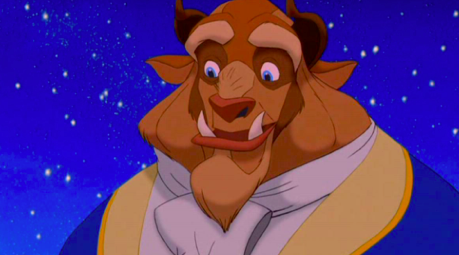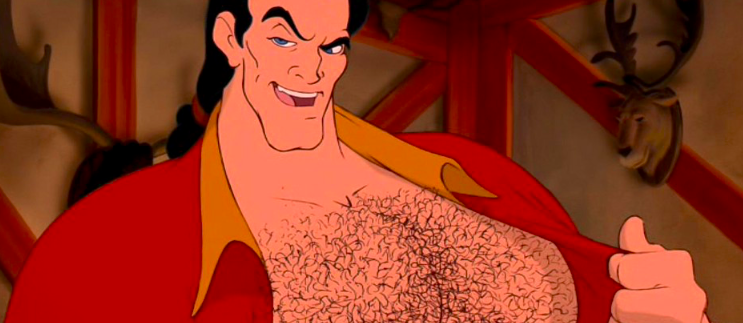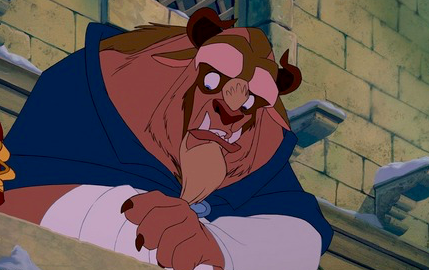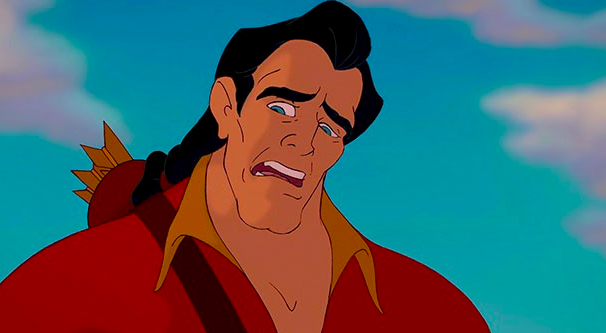Participants of my ongoing Saving Cinderella class have the option to a write guest post on the topic of the session they attended. This post is in response to Session 4 Bestiality? Belle and the appeal of the monster.
To watch past sessions of the class, click here.
The following was written by Eric M. Blake.
In a recent discussion with Faith Moore and others, I brought up an important theme in Beauty & The Beast, necessarily secondary to the issues directly centered around Belle and the Disney Princess mythos, but important nonetheless:
Through the characters of Gaston and The Beast, the film directly addresses the all-important question in our society: What does it truly mean to be a man? Not an adult male, mind you; not a “guy”—a man.

I recall the time a couple fellows showed up in a college class of mine from REAL—an organization centered on, from what I gathered, grounding college-age guys in modern chivalry, in the context of campus culture.
Now, I don’t know much about REAL: Maybe there’s a pseudo-feminist anti-masculinity agenda with them, I don’t know. All I know is, these two seemed as far from Male Feminist Betas as one could imagine. The one who spoke looked not unlike Chris Evans’s Captain America—with a similar personality, to boot.
Anyway, their organization’s shirts had the following slogan: “REAL men get consent.”
I want to focus on that: “REAL men.” The idea of being something beyond an “adult male.” Something more.
Something greater.
In a recent article, Faith noted her former crush on Gaston, for his clear external masculinity. As she put it: “For a girl just beginning to think about romantic attachments, Gaston was exactly what I was looking for: a man.”

She explains that it’s all external, of course: the deep voice, the muscles, etc. But as I noted in our discussion, there’s a vital, clear-cut difference between Gaston and The Beast (aside from the obvious, of course), amid both having such raw, untamed external masculinity:
First and foremost, The Beast understands the need to earn the affections of Belle.

Gaston’s got a sense of entitlement about him. He rhetorically asks LeFou, “Don’t I deserve the best?” He sulks around when Belle turns him down—needing a tavern full of yes-men to prop him up, with a certain song we all know.
Never once does it occur to him that he’s got to earn Belle’s approval. He thinks she’s got to give in automatically.
This is vital, I think. One of the widely accepted elements of masculinity, when you get down to it, is competition. And if there’s no one left to compete with, you compete with yourself—be the best you can always be, lest you slack off and “let yourself go.”
The pseudo-feminists and Gillette marketers may sneer and call it “toxic,” but it’s truly a very positive thing. It’s a constant state of needing to earn. To tweak that slogan a bit, “Real Men earn consent.” And not from the player’s perspective—from the judge’s. That is to say: from hers.
Gaston is no “real man.” He is, if you will, a “man-child.” And frankly, the brief tantrums he throws kinda play that up, don’t they?

Meanwhile, as Faith notes: “In all the ways that Gaston embodied the physicality of maleness, the Beast embodied the essential nature of men. He was independent, proud, and set in his ways. But he was also determined, eager to please, and earnest in his desire to learn. He was brave, loyal, and honest. And he loved with his whole heart, unashamedly, joyfully, and proudly. He was a man. In Beast’s clothing.”
A man. A real man. Not just a glorified man-child with big muscles and a deep voice.
A desire to learn. A desire to earn. Not assume and take for granted what he “deserves.” She’s the judge of that. He’s just the player. Pun half-intended.

ERIC M. BLAKE is the chief Culture & Entertainment writer at Western Free Press. A graduate of the University of South Florida, with a Bachelor’s in Political Science and a Master’s in Film Studies, he is very passionate about political theory and filmmaking–and the connections between the two. Inspired by Andrew Breitbart’s axiom that “Politics is downstream from culture,” he is deeply fascinated by the great influence that popular culture has on public opinion, and is a firm believer in the power of storytelling.
You can also.find him on Twitter, @HardBoiledFilms, and on YouTube, at Hard Boiled Entertainment. Yes, that implies certain cinematic aspirations.
https://westernfreepress.com/time-greatest-conservative-films-introduction-rules/
https://westernfreepress.com/the-culture-current-goals-for-the-right-in-the-culture-war/
https://westernfreepress.com/greatest-conservative-films-enchanted-2007/
Pretty good essay, there. Though that being said, Beast unfortunately also doesn’t qualify as a real male, at least, not during the second half (if I must be honest, Beast in the first half came far closer to being an actual real male). Ironically, Gaston at times came closer to being a real male in a more positive sense than Beast did in the climax. Beast before the second act at least did some more positive male things (male things that ironically enough were outright condemned in the movie), like for example him granting Belle free access to the castle, WITHOUT prodding by his servants, and him being the first between himself and Belle to swallow their pride and attempt to politely request, twice, that she come down to dinner. Oh, and also saving Belle later on. And it’s a safe bet that he was extremely protective of his servants, the closest he had to actual friends before Belle came around. In the second half… I’m sorry, but he was literally willing to just let Gaston and his ilk just smash the castle, potentially kill his servants, not even TRY to defend himself against Gaston, and only bothered to fight back because Belle just happened to be nearby. I’m not sure that is really a good example of masculinity. It’s more like someone who had his balls removed, if I must be blunt, or even a beta male.
And quite frankly, even the likes of Gaston was certainly closer to a real man compared to Lumiere. At least Gaston, arrogant headstart, a jackass, and, yes, a manchild he might be, was still mature and smart enough, not to mention actually moral enough, to realize he should only stick with one woman, and not try to hit on married women, or engage in lots of premarital sex from what was shown in the movie, while Lumiere just sleeps around with any woman he can find without a care in the world, even sleeping with married women. I’ll be honest, speaking as a straight man who adheres to Christianity, I have absolutely NO respect for anyone who just sleeps around with multiple women. That just makes us heterosexuals look bad. And unlike Tramp from Lady and the Tramp, who at least gave up his womanizing habit when sticking with Lady, Lumiere was completely unrepentant of his constant sleeping around, and even implied in the special edition that he’ll resume these activities once the curse was broken (and was low enough to actually commit adultery with married women). I find it very ironic that Lumiere is treated as a good guy after all of that, not being condemned for said behavior even once, not even by the likes of Belle, yet Gaston’s villainized when he at least actually respected the sanctity of marriage (heck, he outright ignores the blonde triplets who fawned over him. And if you ask me, those triplets came far closer to actually being the most beautiful women in the village than Belle did.). Want to know who Lumiere reminds me of? Glenn Quagmire from Family Guy, for starters. Probably also Charlie Harper from Two and a Half Men. Or, hey, for real life examples, how about that nihilistic philosopher Jean Paul Sartre?
LikeLike
In the Beast’s defense, he was extremely depressed when Gaston and his cronies broke into the castle. He’d just lost Belle, a woman he really loved, and with her, he lost all hope that the spell would be broken and they would ever be human again. It doesn’t really matter if his house is trashed or his servants die – they’re all doomed anyways. He could have still fought, but it was pointless. When he sees Belle has come back, there is hope again, and that’s when he finally fights back.
In regards to Gaston only sticking to one woman – the silly girls. Need I say more? I don’t know if he was sleeping with them or not, but if he were really a good man, he would tell them straight to stop chasing after them, instead of letting them pine after him and feed his vanity.
LikeLike
Maybe, but were in I his position, I’d probably at least make sure the servants weren’t killed by the mob. Sure, maybe it wouldn’t matter in the end anyway since they’re likely doomed to be furniture, but it at least wouldn’t have had them being brutally murdered.
As far as Gaston or the Silly Girls, he largely ignored them. He could have at least flirted with them as a hint that he might be unfaithful to Belle ultimately, either verbally or non-verbally, yet he hasn’t interacted with them in any way other than using them as a barbell once. In the movie, there’s literally nothing indicating that he even had a one-night stand with them or slept with them repeatedly. That’s leagues different from Lumiere, where it’s made extremely obvious via Fifi, Angelique, heck, that Human Again song where he has hit on and slept with married women. So, like I said, he still stuck to one woman, especially compared to Lumiere who basically most likely slept with most of the female populace in the castle and was explicitly an unrepentant womanizer. In fact, Lumiere’s womanizing was so obvious that I’m surprised that a kid’s movie got away with showing that kind of behavior, not to mention actually painted it in a positive light (I know Belle didn’t seem to call Lumiere out on that).
LikeLike
And just as an FYI, I don’t even like Gaston, so don’t think I’m saying any of this because I like him. Actually, if I must be honest, I actually WANTED to see his broken body in that ravine, that’s how much I disliked him.
LikeLike